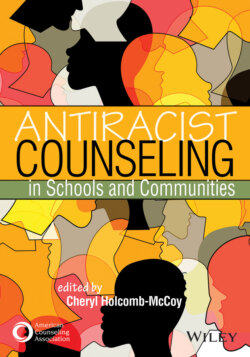Читать книгу Antiracist Counseling in Schools and Communities - Группа авторов - Страница 23
Cross-Cultural and Multicultural Counseling and Psychology
ОглавлениеIn 1982, Derald Wing Sue and six of his colleagues ignited the cross-cultural and multicultural counseling movement when they published the article “Position Paper: Cross-Cultural Counseling Competencies.” Sue et al. (1982) argued that traditional mental health practices (including counseling) and research were irrelevant to ethnic minorities. They proposed a push for new approaches to counseling that would be more appropriate for the culturally different. Sue et al.’s framework for cross-cultural counseling led to the triad of components of cultural competence: cultural knowledge, cultural awareness, and cross-cultural skills. A plethora of literature emerged from Sue et al.’s article. Pedersen (1990) even described the cross-cultural and multicultural counseling movement as the fourth force in counseling because of its rapid growth and visibility in the field.
In addition to components of cultural competence, the cross-cultural counseling movement focuses on studying similarities and differences in individual psychological functioning based on cultural and/or ethnic background. Scholars and researchers of cross-cultural counseling and multicultural counseling regard culture as essential to psychological functioning, an integral context for psychological development and behavior. Multicultural counseling specifically addresses factors within the counseling process when the client and counselor represent different cultures. This strengths-based approach considers the sociocultural factors that impact the client and counselor. The client’s and the counselor’s race and racism are considered, but the framework for multicultural and cross-cultural counseling is culture, not race. See Box 2 for cross-cultural scholars.
In 1972, another group formed specifically to address the issues of Black and Brown counselors and clients. The new group, the Association for Non-White Concerns in Personnel and Guidance, became a separate division of the American Personnel and Guidance Association, which is now the American Counseling Association (ACA). Before the group was formed, its members had limited representation and no voting rights on the board of directors of the American Personnel and Guidance Association. The individual most often identified as the father of the Association for Non-White Concerns in Personnel and Guidance is Samuel H. Johnson. The name of the group was changed to the Association for Multicultural Counseling and Development (AMCD) in 1985 to more accurately reflect its efforts. The mission of the association is
